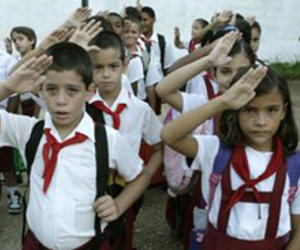Latin lessons: What can we learn from the world’s most ambitious literacy campaign? Part 2
- Submitted by: manso
- Editorial Articles
- 11 / 08 / 2010

Sunday, 7 November 2010.By: JOSE GOITIA. Fifty years ago this month, Cuba committed itself to teach every citizen basic literacy. Today, the country's education system is the envy of the rest of the world. Nina Lakhani travels to Havana to discover the story behind the success – and ask why some believe that cracks are starting to show...
Schools were suspended across the country from April 1961 so that every teacher could teach and co-ordinate the 100,000 volunteers, half of whom were girls. Thousands of adults were drafted in as teachers over the last few months of that year, in order to ensure its success – and avoid embarrassment for Castro. Never before, or since, has a country used masses of unqualified teachers in such a co-ordinated way. The daily newspaper, Revolucion, published sketch maps showing each village and town that conquered illiteracy, as it happened. Everyone who had the intellectual capacity to learn was taught: the oldest person was a woman aged 106, a former slave.
Cantelar himself had mixed success: the old man dropped out after some weeks but his son, Ildo Estevez, learnt to read and write after three months and like all new literates, he wrote to Fidel, thanking him for the opportunity. Now aged 13, Cantelar joined a brigade in the northern province of Matanzas, teaching several families who worked in a salt farm, until the campaign was declared a success in December 1961: the illiteracy rate had been slashed from 25 per cent to less than 4 per cent within a year. Hundreds of thousands of alfabetizadores marched euphorically to the Plaza de la Revolucion on 22 December, carrying giant pencils, chanting, "Fidel Fidel tell us what else we can do". "Study, study, study!" came the reply. And they did.
Within months, a programme was set up for the new literates, now hungry for knowledge, to continue studying up to sixth grade, the equivalent of a primary education. Teacher-training was reformed and thousands of classrooms built; primary- and pre-school education were almost universally available in Cuba by 1970 (45 years ahead of the UN's 2015 deadline for its Millennium Development Goal).
College and university education expanded, became free, and started focusing on courses that reflected the country's skill shortages, and agricultural sciences, engineering, medicine and teaching degrees, for example, proliferated. Cuba's world-renowned healthcare system developed on the back of its educational reforms; there are now 23 medical schools in Cuba, up from three in 1959.
These changes happened at a furious pace, with the emphasis on quantity rather than quality at first, but today its defenders, such as Diosdada Vidal Valle, executive member of the education, science and sports union, claim that Cuba has a flexible education system which regularly reforms, often because of grass-roots pressure from parents and teachers.
So why did Cuba succeed where so many other literacy campaigns failed? The mass mobilisation of volunteer teachers and a system that used pictures depicting everyday scenes which people could relate to, discuss, and then learn to read and write about, were key factors, according to ' the doctor and educationalist Theodore Macdonald, honorary visiting professor at London Metropolitan University's Human Rights & Social Justice Research Institute, who has worked in, and written about, Cuba's education system. He believes that people were convinced of the need to read and write not just for their own sakes, but for the good of the country, which had lost huge numbers of skilled professionals, who had fled to Miami after the revolution. "The genius of the Cuban campaign was that they made it make a difference," he says. "It wasn't just about peasants becoming literate; it was about learning to read so they could join in politically and socially: there was a point to it. And then they wanted more."
The symbolic thank-you letters to Fidel, used by Unesco to evaluate the success of the campaign in 1964, are kept along with photographs and details of all 100,000 volunteers in a wonderful museum in La Ciudad Libertad, or the City of Liberty, which is situated in the former, vast Batista headquarters in the western suburbs of Havana. The former government offices and officials' homes are now home to bright, airy classrooms for several schools, colleges and universities, including three special schools for children with autism, learning disabilities and visual impairments.
Luisa Yara Campos, literacy museum director, teacher and committed socialist of some 40 years' standing, says: "Before 1959 it was the countryside versus the city. The literacy campaign united the country because, for the first time, people from the city understood how hard life was for people before the revolution, that they survived on their own, and that as people they had much in common. This was very important for the new government."
Over the past 50 years, thousands of Cuban literacy teachers have volunteered in countries such as Haiti, Nicaragua and Mozambique. Critics claim that this is motivated by the desire to promote socialist propaganda and the government's reputation in these countries. But Dr Jaime Canfux Gutiérrez, director of literacy at the Latin American and Caribbean Pedagogical Institute in La Ciudad Libertad, insists that this initiative is about promotion of Marti's principle of "literacy without borders". "This is about education for everyone as a human right, no matter who you are or where you live."
Source:www.independent.co.uk/news/world/americas/
Comments